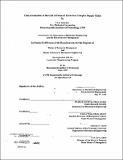Characterization of the cost of forecast error in a complex supply chain
Author(s)
Schechter, Chris (Chris David), 1972-
DownloadFull printable version (7.388Mb)
Other Contributors
Sloan School of Management.
Advisor
Stanley B. Gershwin, Yashan Wang and Anthony T. Patera.
Terms of use
Metadata
Show full item recordAbstract
The importance of forecast accuracy is increasing in the semiconductor industry due to two compounding factors. The complexity of the manufacturing process is increasing which causes manufacturing cycle times to increase as well. Further, the lifecycle of products is decreasing. Thus manufacturers have to increasingly build ahead of demand while anticipating customer preference with increasing accuracy. This thesis investigates the origins of demand forecast inaccuracies at Digital Semiconductor as well as · characterizes the main supply chain costs of forecast inaccuracy. The forecasting cycle is a complicated chain spanning several functional groups each with their own incentives and interests. For Digital Semiconductor, the process is complicated by having one manufacturing site servicing five product lines which each have very different customers, competitors and product specifications. A successful process results in having the right type and number of parts available to customers at the right time. An over-optimistic forecast results in excess inventory and obsolescence, whereas a forecast that is too conservative will result in stock-outs and loss of customers. The thesis starts with a detailed analysis of Digital Semiconductor's forecasting process. We then describe the analysis and methodology we used to develop a model of Digital Semiconductor's supply chain. This model allowed us to characterize the supply chain costs of historical forecast errors. The thesis concludes with recommendations to improve the forecasting process at Digital Semiconductor.
Description
Thesis (S.M.)--Massachusetts Institute of Technology, Dept. of Mechanical Engineering; and, (M.B.A.)--Massachusetts Institute of Technology, Sloan School of Management, 1998. Includes bibliographical references (p. 93).
Date issued
1998Department
Massachusetts Institute of Technology. Department of Mechanical Engineering; Sloan School of ManagementPublisher
Massachusetts Institute of Technology
Keywords
Mechanical Engineering., Sloan School of Management.